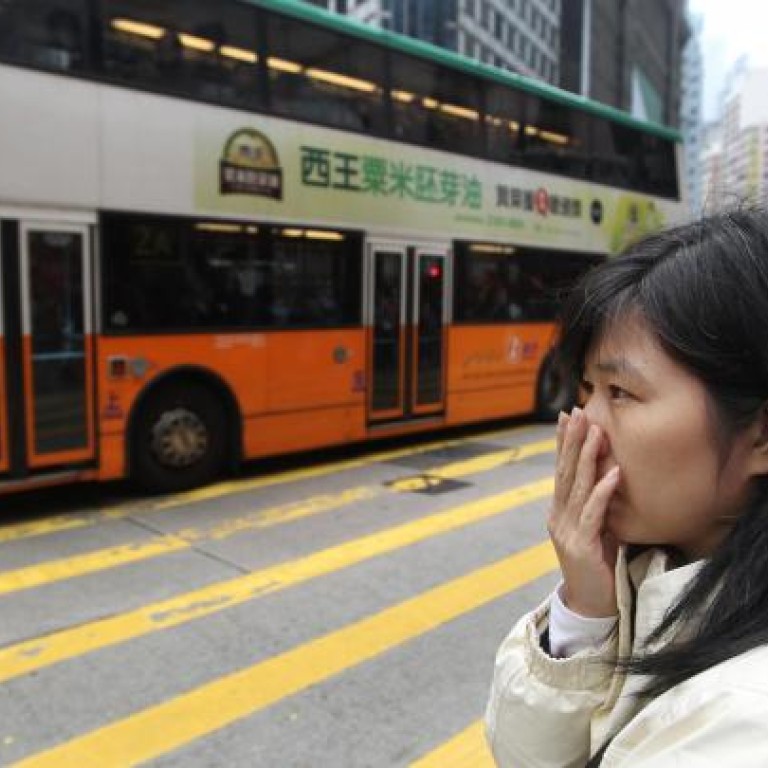
Never mind the weight, what about the concentration?
The emissions inventory for Hong Kong for 2010 released by the Environmental Protection Department on Wednesday made interesting reading. The report goes into some detail on the volumes of the various emissions and their sources. Hong Kong hit its target established in 1997 under the joint scheme set up with Guangdong province. This it achieved by picking some very low-hanging fruit, that is, by making the power companies fix scrubbers to their power stations. But all this discussion of the weight of the various emissions is beside the point.
The important issue is the concentration of these emissions. Most of the emissions that affect people in urban areas occur at the roadside. We see from the government's own emissions data that roadside pollution is frequently at dangerously high levels. The Hedley Environmental Index relates Hong Kong's emission levels to World Health Organisation guidelines. Anyone looking at the Hedley index yesterday would see that it was off the scale and indicated that pollution levels were "very dangerous" to health.
Some weeks ago, the new undersecretary for the environment made the point that air pollution was related to public health. This was an historic statement, since it was the first time the Hong Kong government had conceded this point. But looking at the emissions report and reading some of the government's comments, this link between air quality and public health doesn't seem to be embedded in the thinking of many environment officials. So Hong Kong may have hit its emission targets - but has this resulted in an improvement in public health? Are there now fewer avoidable deaths as a result of this so- called improvement? This is the real point of examining air quality. Since the concentration of roadside emissions is still dangerously high, the answer to these questions is definitely no. If there is no improvement in public health impacts, then trumpeting the reduction in the weight of emissions alone is a meaningless academic exercise.
AIA chief executive Mark Tucker is fond of saying his company is "99 per cent focused on organic growth", with 1 per cent from M&A growth. He said it in February and repeated it yesterday at the company's news conference to discuss its US$1.73 billion acquisition of ING Malaysia. One reporter asked Tucker how AIA's latest acquisition squared with his 99 per cent remark. Without missing a beat, Tucker said that when he said that, he meant "AIA will spend 99 per cent of its time on organic growth". The reporter's disappointment was palpable: " Oh … your time," he said, as his jaw dropped at the enormity of this rhetorical sleight. In future, when CEOs say they are focusing on organic growth, reporters will need to ask the question: "Would that be by value or time?"
The "spot the watch" online anti-corruption movement has triggered a whopping newspaper censorship scandal. The movement - in which netizens scour for photographic evidence of public servants wearing suspiciously expensive watches - hit the jackpot recently. According to the website Tea Leaf Nation, which follows the mainland's social media, the editor-in-chief of es in Yunnan tweeted on Sina Weibo that his paper was running a story about the Fujian transport chief's attire the next day, since he was visiting Yunnan. In the story, he was shown wearing a Rado diamond watch worth 50,000 yuan (HK$61,750) and a belt worth 15,000 yuan.
But in the early hours, after the newspaper had been printed, its editors received calls from Yunnan's provincial party committee, its propaganda department and other government offices requesting withdrawal of the piece on behalf of the Fujian provincial party committee. So the story was never printed, but it was reported on Weibo and, according to the University of Hong Kong's Weiboscope, was retweeted more than 107,000 times and received more than 32,000 comments before being taken down by censors.
The outraged editor said on Weibo: "As a journalist from Fujian, I have never felt so angry and ashamed. I hate and despise the black hands that reached over thousands of miles … I hold to my belief that those people will answer for what they did eventually."

